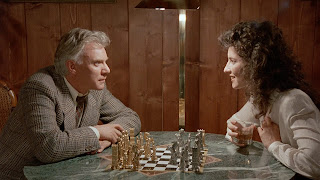THE CALLER
(US - 1989)
Directed by Arthur Allan Seidelman. Written by Michael Sloan. Cast: Malcolm McDowell, Madolyn Smith. (R, 97 mins)
An Empire Pictures production that really only turns into something recognizably "Empire Pictures" in its last ten minutes, THE CALLER is a bizarre oddity that connoisseurs of '80s cult movies have pretty much kept to themselves. A dialogue-heavy two-hander mostly confined to a single set except for a couple of exteriors and one brief drive down a mountain road, THE CALLER was written by Michael Sloan, best known as the creator of the acclaimed 1980s CBS series THE EQUALIZER. In its style and structure, it plays a lot like a TV-movie, not surprising given that journeyman director Arthur Allan Seidelman has spent most of his long career as a small-screen hired gun (though he did helm Arnold Schwarzenegger's 1970 debut HERCULES IN NEW YORK). Shot in Rome at Empire's Italian studio, THE CALLER opens with an exterior supermarket parking lot set so blatantly phony that you might be inclined to think it's some Italian production design team's idea of a "normal American parking lot." Whether that's a happy accident that's taking advantage of an existing set is up for debate, but the artifice in these early scenes of THE CALLER is so pronounced that it creates such a sense of disconnect from reality that, eventually, it's quite clear that it's by design. That also extends to the staginess of the entire project, set almost entirely in a remote cabin that seems designed more for a Country Living photo spread than a place where one might actually live. An unnamed woman (Madolyn Smith) returns home from shopping after finding an abandoned car in the forest around her home. She appears to live alone, but there are framed photos all over the house indicating that she has (or had) a husband and a daughter who are presently nowhere to be found.
 |
Mind you, this synopsis makes just as much sense watching it play out as it does reading it. The artifice of the production design, along with the jarring tonal shifts, and the stilted acting, particularly by Smith, combine for a frequently off-putting effect but rest assured, it's all intentional. Things don't become any clearer after a fade to black around the midpoint, followed by the two of them crossing paths once again the next morning in the supermarket parking lot, with McDowell suddenly dressed like he just blew through a gift card from Bass Pro Shops. And there's never anyone else around (she stops at a gas station in the beginning of the film and leaves money on the pump when she can't find an attendant). Given Sloan's roots in television (he also created the short-lived Lee Van Cleef NBC ninja series THE MASTER), THE CALLER feels an awful lot like it should've been an episode of the '80s TWILIGHT ZONE revival, especially with what transpires in the absolutely bonkers climax. There's a good idea here, but it's a 30-to-45-minute TV episode idea that just becomes repetitive and tiresome as a feature-length film. That is, until it goes completely berserk in the last ten minutes. Given how it pans out, THE CALLER, just out on Blu-ray from Vinegar Syndrome (because physical media is dead), might be a rare example of a twist-ending film that plays better on a second viewing, when you know how it ends and can watch for all the hints along the way. Smith's mannered, erratic performance certainly makes a lot more sense once you know the big reveal. The film itself still may not make much sense by the end, and its an extremely laborious set-up getting there, but you can't help but admire its go-for-broke audacity and its off-the-charts WTF? factor. THE CALLER was shot in late 1986, but aside from a 1987 Cannes screening and another festival in Italy that summer, its release was stalled by Empire's financial troubles and eventual bankruptcy prior to its 1989 rebirth as Full Moon Entertainment. They sold a number of titles to various other distributors, and THE CALLER ended up with Trans World Entertainment, who gave it a belated straight-to-video at the tail end of 1989.





No comments:
Post a Comment